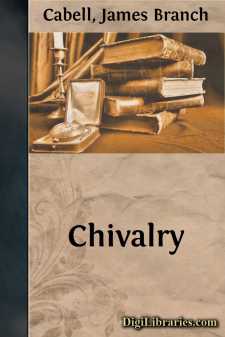Categories
- Antiques & Collectibles 13
- Architecture 36
- Art 48
- Bibles 22
- Biography & Autobiography 813
- Body, Mind & Spirit 142
- Business & Economics 28
- Children's Books 17
- Children's Fiction 14
- Computers 4
- Cooking 94
- Crafts & Hobbies 4
- Drama 346
- Education 46
- Family & Relationships 57
- Fiction 11829
- Games 19
- Gardening 17
- Health & Fitness 34
- History 1377
- House & Home 1
- Humor 147
- Juvenile Fiction 1873
- Juvenile Nonfiction 202
- Language Arts & Disciplines 88
- Law 16
- Literary Collections 686
- Literary Criticism 179
- Mathematics 13
- Medical 41
- Music 40
- Nature 179
- Non-Classifiable 1768
- Performing Arts 7
- Periodicals 1453
- Philosophy 64
- Photography 2
- Poetry 896
- Political Science 203
- Psychology 42
- Reference 154
- Religion 513
- Science 126
- Self-Help 84
- Social Science 81
- Sports & Recreation 34
- Study Aids 3
- Technology & Engineering 59
- Transportation 23
- Travel 463
- True Crime 29
Chivalry
Description:
Excerpt
I
THE STORY OF THE SESTINA
“Armatz de fust e de fer e d’acier,
Mos ostal seran bosc, fregz, e semdier,
E mas cansos sestinas e descortz,
E mantenrai los frevols contra ’ls fortz.”
THE FIRST NOVEL.—ALIANORA OF PROVENCE, COMING IN DISGUISE AND IN ADVERSITY TO A CERTAIN CLERK, IS BY HIM CONDUCTED ACROSS A HOSTILE COUNTRY; AND IN THAT TROUBLED JOURNEY ARE MADE MANIFEST TO EACH THE SNARES WHICH HAD BEGUILED THEM AFORETIME.The Story of the Sestina
In this place we have to do with the opening tale of the Dizain of Queens. I abridge, as afterward, at discretion; and an initial account of the Barons’ War, among other superfluities, I amputate as more remarkable for veracity than interest. The result, we will agree at outset, is that to the Norman cleric appertains whatever these tales may have of merit, whereas what you find distasteful in them you must impute to my delinquencies in skill rather than in volition.
Within the half hour after de Giars’ death (here one overtakes Nicolas mid-course in narrative) Dame Alianora thus stood alone in the corridor of a strange house. Beyond the arras the steward and his lord were at irritable converse.
First, “If the woman be hungry,” spoke a high and peevish voice, “feed her. If she need money, give it to her. But do not annoy me.”
“This woman demands to see the master of the house,” the steward then retorted.
“O incredible Boeotian, inform her that the master of the house has no time to waste upon vagabonds who select the middle of the night as an eligible time to pop out of nowhere. Why did you not do so in the beginning, you dolt?” The speaker got for answer only a deferential cough, and very shortly continued: “This is remarkably vexatious. Vox et praeterea nihil—which signifies, Yeck, that to converse with women is always delightful. Admit her.” This was done, and Dame Alianora came into an apartment littered with papers, where a neat and shriveled gentleman of fifty-odd sat at a desk and scowled.
He presently said, “You may go, Yeck.” He had risen, the magisterial attitude with which he had awaited her entrance cast aside. “Oh, God!” he said; “you, madame!” His thin hands, scholarly hands, were plucking at the air.
Dame Alianora had paused, greatly astonished, and there was an interval before she said, “I do not recognize you, messire.”
“And yet, madame, I recall very clearly that some thirty years ago the King-Count Raymond Bérenger, then reigning in Provence, had about his court four daughters, each one of whom was afterward wedded to a king. First, Meregrett, the eldest, now regnant in France; then Alianora, the second and most beautiful of these daughters, whom troubadours hymned as the Unattainable Princess. She was married a long while ago, madame, to the King of England, Lord Henry, third of that name to reign in these islands.”
Dame Alianora’s eyes were narrowing. “There is something in your voice,” she said, “which I recall.”
He answered: “Madame and Queen, that is very likely, for it is a voice which sang a deal in Provence when both of us were younger....












